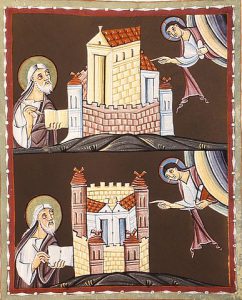 What Does Jesus Mean by “Defiled Their Garments”?
What Does Jesus Mean by “Defiled Their Garments”?
In Revelation 3:4, Jesus commends those who are exceptions to his criticism of the Sardis church. He says, “But you have a few names in Sardis who have not defiled their garments, and they will walk with me in white garments, for they are worthy” (3:4). The problem with the garments of most of the people at Sardis is not that they are dirty or stained, but that they have become unclean, impure, or defiled. According to Leviticus and Numbers, those who become unclean through contact with uncleanness need to wash their bodies and their garments, because both are unclean. In the New Testament and Revelation, uncleanness or impurity is a little different. People become unclean or impure due to their participation in sinful actions so that they need to be cleansed of their sins. Since this type of impurity is primarily internal and not external, the New Testament is not generally concerned with cleansing garments. Thus, the language of Revelation 3:4 is an unusual use of Old Testament ritual purity language that needs to be interpreted.
The sinners at Sardis have become unclean or impure due to their sins. Jesus borrows from the Old Testament the conception that unclean people wear unclean garments. Their uncleanness means that they are not fit to be among those who will enter the New Jerusalem and approach God there (21:27; 22:3-4). The only effective means for cleansing is the blood of the Lamb (1 John 1:7; Rev. 7:14). The problem is that the cleansing power of the blood of the Lamb is only available to the servants of the Lamb. Thus, most of the church of Sardis needs to repent of their sins, ask Jesus for forgiveness, and forsake their sins. Then, they would be cleansed of their sins (1 John 1:7, 9) and they would no longer be unclean people with unclean garments. Jesus is using symbolic language here. His concern is with the condition of the people, not with their actual, physical garments. The sinners at Sardis have defiled themselves by their sins. Jesus refers to their spiritual condition in terms of defiled garments; washing their clothing in water will do them no good. They must wash away their sins in the blood of the Lamb (1 John 1:7, 9). Then, they will be clean and pure and, in the eyes of Christ, their spiritual garments will be clean and pure.
But Some Have Not Defiled Their Garments
In contrast to the sinners at Sardis, Revelation 3:4 refers to the few people at Sardis “who have not defiled their garments.” These are the faithful servants of Jesus at Sardis. When Jesus sees them, he sees spiritual garments that are pure. They will be rewarded when Jesus comes back, for “they are worthy” (3:4). Their reward is to “walk with me in white garments” (3:4). This promise of being with Christ and having white garments anticipates Revelation 7:14-15. All of the faithful servants of the Lamb will one day dwell with him and serve him as his priests. Like the robes of the Old Testament priests, they will have robes cleansed with the blood of a sacrifice. Their robes will one day be perfectly white and clean, because they have received the benefits of the blood of the perfect sacrifice, the Lamb of God. Therefore, the faithful ones at Sardis will one day join all of the Lamb’s faithful conquerors in perfectly white robes that have been washed in the Lamb’s blood (7:14).
Sources:
These paragraphs are slightly edited portions of my book:
Paul Hoskins, The Book of Revelation: A Theological and Exegetical Commentary, pp. 103-104 (those pages provide further sources and footnotes that I have omitted above).
